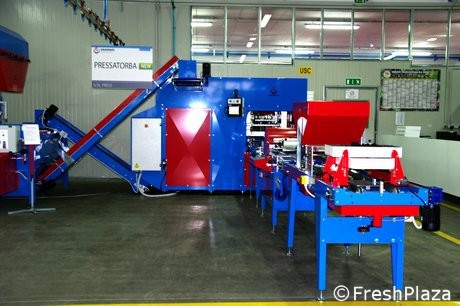
One of the Urbinati equipments.
Amongst these, 200 visitors were registered for a training course on ‘Innovation and Technology transfer in horticultural nursery’. The course has been organized by the Urbinati Academy, especially by Romina Urbinati (General Manager) and Massimo Sepe (Operations Manager), and by the University of Torino (Italy) with technical and scientific coordination of Professor Silvana Nicola.

On Friday, the Netherlands enterprise Clean Light has shown the clean light technology, which use UV radiation to protect the vegetable crops without chemical inputs, and Israeli experts have shown some grafting technologies and irrigation systems.
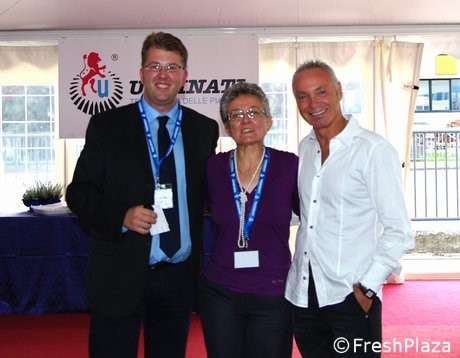
From left to right: Massimo Sepe (Urbinati), Silvana Nicola (University of Turin - Italy), Nino Urbinati (general manager of Urbinati).
On Saturday, Urbinati invited nursery experts as speakers for training course.
Professor Silvana Nicola was the chairperson of the course.
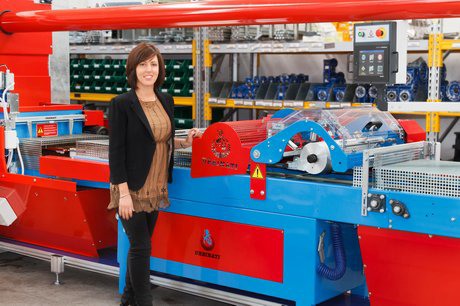
Romina Urbinati.
A brief report of oral communications follows.
The professor Silvana Nicola introduced the course making a general overview of current issues in the field of horticultural nurseries in Italy and in the international market. Nicola stressed the critical issues concerning the production scheduling, production costs, and seedling quality, which has been assessed considering genetic, sanitary, and agronomic quality. She concluded by suggesting the necessity to create EU guidelines concerning the phenological prerequisites of seedlings according to the species and the variety. These prerequisites could be uniformity, well developed green leaves, true leaf number, strong and well developed stem, well developed root system, free from root binding, seedling vigor index, etc.
The Dr Alberto Veronesi, seed expert, talked about the genetic and technological innovations in the Italian vegetable supply chain.
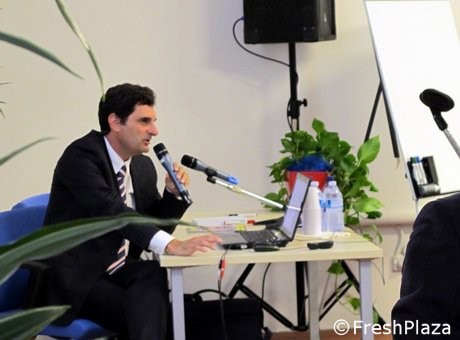
Alberto Veronesi.
He showed data that underlines the importance of Italian vegetable production in Europe. In Italy there are:
- over 20 seed companies, legal identity of multinational or Italian family companies, with huge investments in research, production sales and marketing of vegetable seed varieties;
- more than 100 nurseries, some of them work also at European level, specialized in production of young plants of some crops, thanks to the investments in human resources and facilities they are really growers’ business partners, in some cases with good innovation abilities;
- around 23,000 growers, in all the regions of the country, produce more than one hundred different crops on a surface of 250,000 ha to supply daily local and European markets through cooperatives, shippers, traders, processing companies, wholesale markets and large distribution platforms.
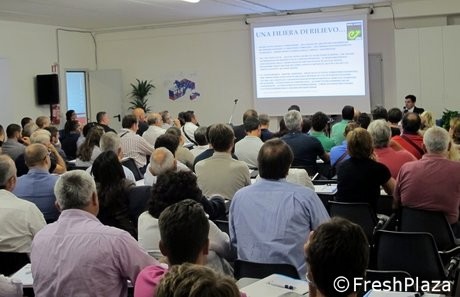
Alberto Veronesi during his presentation.
In addition, Veronesi explained the hard genetic research work of seed companies to find new varieties responding to the market requests concerning the pre- and post-harvest handling of the produce and the quality attributes of the final product at the consumtion. Ultimately, Veronesi underlined the increasing importance of the research, production and sales of organic seeds being Italy the second EU Country, after Germany, for the organic vegetable production.
The professor Paolo Sambo (University of Padova, Italy) showned the potential of alternative substrates to peat, such as organic material from marine plants, agricultural, natural and civil by-products and waste, food processing and inorganic materials (perlite, vermiculite, rock wool, etc.)
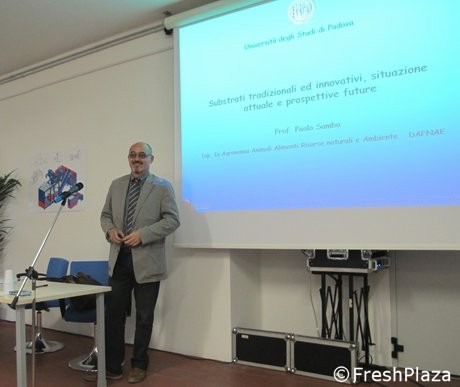
Paolo Sambo.
Sambo described the physical and chemical characteristics, the advantages and disadvantages of rice hull. Comparing the rice hulls with peat, Sambo highlighted the rice hulls 1) structure, whose macroporosity ranges from 20 to 40% and microporosity ranges from 40 to 60%, 2) cationic exchange capacity (CEC) that being less than peat CEC (ca. 44 vs 100-170 meq/100g) could manage better the fertilization, 3) carbon/nitrogen ratio (C/N) that being greater than C/N peat (114 vs 20-80) could use the same substrate for seedling growth cycle lasting over 4-6 weeks.
The professor Paolo Zanin (University of Padova, Italy) continued the discussion on alternatives substrates to peat showing actual cases on the effects of using the rice hulls mixed with other substrates on seedling growth (tomato, pepper, chicory, Salvia spp., etc.) and on cutting rooting (Rosa spp., Pelargonium spp., etc.)
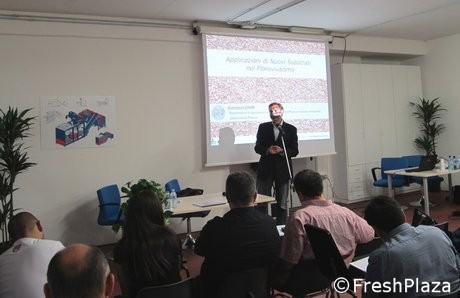
Paolo Zanin.
The professors of University of Padova have concluded that rice hulls is a substrate with optimal potential if it is mixed from 25 to 75% with other substrates according to the horticultural species.
The Dr Pier Franco Baraglia, plant nutrition expert, has talked about the fertilization and the importance of soluble fertilizers in specialized nursery. Baraglia has explained the plant physiology of seedlings during nursery phase. Especially, he has described how the root development, vegetative control, and transplanting stress can be managed adjusting either the hormonal message by using auxins or cytokinins or the chemical message by using nutritional elements according as we want to stimulate leaf or root production.
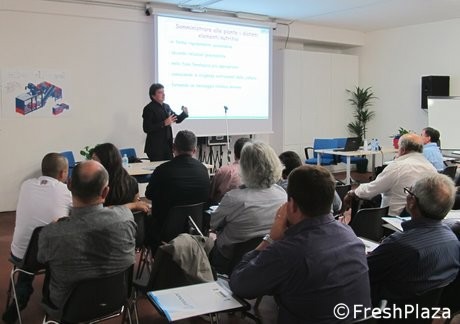
Pier Franco Baraglia.
Ultimately, Baraglia has highlighted the importance of nutritional elements in terms of 1) the relationships among different elements (Nitrogen/Phosphorus, Nitrogen/Potassium, Calcium/Potassium, etc.); 2) the chemical form of the supplied element; 3) the antagonism and synergism among the different elements.
Professor Silvana Nicola has closed the course commenting on the importance of innovation and technology transfer in the horticultural nursery being the first link of the vegetable supply chain!
All oral communications have been appreciated considering the several questions from audience that was from different Continents.
Thanks to Urbinati Accademy for this opportunity of meeting and discussion among the actors of the horticultural nursery sector. For more information: the .pdf files containing the oral communications will be available as soon as possible on web site: www.urbinati.com.
